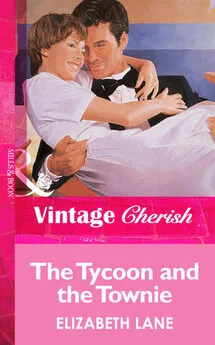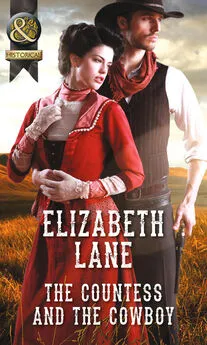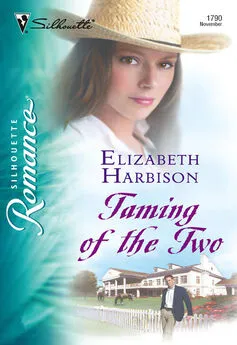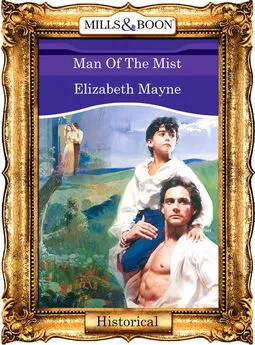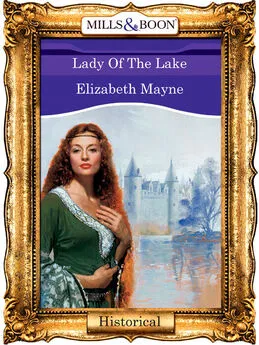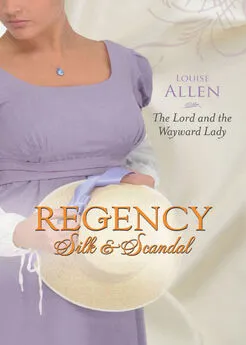Elizabeth Mayne - Lord Of The Isle
- Название:Lord Of The Isle
- Автор:
- Жанр:
- Издательство:неизвестно
- Год:неизвестен
- ISBN:нет данных
- Рейтинг:
- Избранное:Добавить в избранное
-
Отзывы:
-
Ваша оценка:
Elizabeth Mayne - Lord Of The Isle краткое содержание
Lord Of The Isle - читать онлайн бесплатно ознакомительный отрывок
Интервал:
Закладка:
“I haven’t the foggiest idea.”
Morgana tilted the glass to her lips and finished it. She rather liked the whiskey’s immediate ability to start an internal heat. The ache in her jaw numbed, the back of her neck and her hip throbbed a little less ferociously. Her fingers trembled as she put the glass on the marble mantel.
“You will forgive me if I call you a liar to your face, then, won’t you, Morgana Fitzgerald?” She jerked when he said “Fitzgerald.” “A few years back, I had the dubious honor of attending Parliament when the latest writ of proscription against the house of Geraldine was read into law.
“More recently, Her Majesty insisted I attend the execution of an Irishman named Warren Henry Fitzgerald, as a lesson in prudent stewardship prior to my return to Tyrone. It is an act of treason to use the name Fitzgerald nowadays, isn’t it? Is that why you claim to be known as Morgana of Kildare?”
Morgana chose to say nothing. She turned to warm her back at the fire. A pair of burly servants toted a huge wooden tub into the solar. Hugh directed them to place it near the fire.
Both he and Morgana stepped back, allowing a stream of servants bearing steaming buckets to fill the tub. A short, heavyset woman supervised that work, and the laying out of towels, soaps and fresh clothing.
“We shall have to continue this conversation on the morrow, Morgana.” Hugh motioned the woman forward. “Here is my housekeeper, Mrs. Carrick, come to help you out of these wet clothes. A hot bath will soothe and restore you, though I do suggest you make a strong effort to stay awake after your bath, Morgana.”
“Why is that?” Morgana asked suspiciously.
Hugh brought his hands to her cheek and chin, touching the bruises on her face. With uncanny accuracy, he found a throbbing lump at her temple.
“People who sleep too soon after taking serious blows to the head sometimes have the ill fortune of never waking up. I shouldn’t want that to happen to you,” Hugh said firmly. “It would bode ill for the O’Neills to have another Fitzgerald woman die in this house.”
“I don’t know what you are talking about.” Morgana lied with deliberate ease. “I’ve told you, my name is Morgana of Kildare.”
Hugh stopped himself from saying, And I’m Richard III. No good would be served by engaging in a verbal fencing match with her at this moment. She needed a bath and the cosseting of other women. The morning would be soon enough for her to answer his many questions.
Answer all of them, she would.
He realized then that he wanted to take this battered woman to the trial of James Kelly. Not because she could testify to Kelly’s boastful confession of killing Shane the Proud—the council of elders would consider that hear-say—but because under brehon law, rape was a capital crime, punishable by death.
Hugh’s corroborating testimony as a witness to that crime was enough to condemn Kelly. His kerns had also witnessed that crime.
Whereas Hugh had no proof that Kelly had murdered Shane the Valiant. He doubted they could elicit a confession before the council. The elder judges would not condemn Kelly without irrefutable proof that he had committed the murder. Rumors and gossip were not testimony.
Hugh turned to Mrs. Carrick, giving her instructions, and left Morgana in her care. He didn’t bother with explaining how the woman had gotten in the shape she was. Some things were not to be spoken of, to Hugh’s mind. Better that the women dealt with such things in their own way.
Morgana sagged onto a high-backed chair after the O’Neill departed. Without his presence in the chamber, she had no reason to continue to play the brave heroine while the last buckets were poured. She let her head drop to her knees and let go of all the worries and fears that had assaulted her from the start of this day to the end.
A babble of women’s voices crooning in Irish wafted over and around her, soothing her, taking her back to May-nooth, before it was razed to the ground and burned.
Her wet nurse and nanny had been Irish. Their language lay deep in Morgana’s memories of childhood safety, security and love. All that was gone.
Morgana had only her wits to keep her alive. She must get to Dunluce. She had time enough still. All wasn’t lost. Grace O’Malley had promised she would put into port at Dunluce on the tenth of May. No sooner and no later.
Morgana had every intention of being there when O’Malley’s ship, the Avenger, docked.
Chapter Five
Mrs. Carrick bent over the softly weeping woman to gently shake her shoulder. “Here, now, my lady. The tub is ready. Come. Let us get you clean. You don’t have to do a thing.”
It was good that the housekeeper felt that way, because Morgana couldn’t have done anything for herself. Now that she was out of the elements, aches too numerous to count had increased tenfold. She knew without having to look for confirmation that her body would be bruised from head to toe.
Mrs. Carrick coaxed Morgana onto her feet and moved her to the tub. Two maids helped her to gently strip away Morgana’s ruined clothes.
Morgana clung to Hugh’s tartan, refusing to let go of it. Wisely, Mrs. Carrick didn’t fuss over such a simple need. She let the poor dear keep the cloth clutched to her bosom.
A girl she was, Mrs. Carrick concluded after supervising the whole procedure of her bath. In Mrs. Carrick’s experience, no woman grown retained a coltish, leggy body for very long past maturity. Certainly she was old enough to be married—all girls were, once their menses had begun. But this lady was young. Mrs. Carrick was convinced the young woman was no older than ten-and-seven.
They had to change the water in the tub twice once they wet her hair. Black Abhainn Mor mud held the tangled coils close and flat against her head. Washed and rinsed until the water ran clear, that head of hair hung past the girl’s knees.
Mrs. Carrick suspected that when it was dry, it would be the color of winter’s Hogmanay fires. Her brows and lashes, and the soft down on her forearms, were as red as autumn apples. Morgana’s skin wasn’t prone to freckles. Unless in the past she had taken great care not to be exposed often to the sun.
A cup of tea and a scone settled the girl’s stomach when leaving the heated tub had made her woozy and dizzy-headed. The judicious use of a leech drained most of the blood swelling the lady’s blackened eye and went a fair ways toward removing the worst of the bruising on her face.
Mrs. Carrick did not ask any questions about any of the injuries she treated. Morgana of Kildare did not offer any explanations or make any observations of her own, either. She seemed to be a stoic sort, and very private.
As for the rest of the physical damage the young woman had suffered, Mrs. Carrick knew time would heal each injury. The razorlike cut from Morgana’s breasts to her throat was most likely going to leave a scar. The origin of that wound caused a troubling frown on Mrs. Carrick’s brow. True, only the young woman’s husband would ever see it, but he would very likely have questions about its origin, too.
On that subject, Mrs. Carrick came away from the solar with numerous questions to put to Sir Hugh. Most importantly, where had the lady come from, and how was it that she had met young Hugh?
For a short while, Mrs. Carrick harbored the idea that Morgana might have met Hugh at court in England. On that subject, Morgana had made the vehement claim that she had never been to England. She’d said she’d never traveled north of the Pale until she’d begun her pilgrimage to Dunluce.
Of the few things Morgana had said, none sounded more outrageous than that she was making a pilgrimage to Dunluce.
No one in his right mind would do that. Mrs. Carrick knew that pilgrims prayed at Saint Patrick’s shrine in his cathedral at Armagh, climbed to the top of Croag Patrick in county Mayo and gave penance by fasting on Skellig Michael off the coast of Kerry.
There were no saints to be honored at Dunluce. Devils, demons, ghosts and fairy folk, yes. Dunluce had evil aplenty.
It was most peculiar.
Mrs. Carrick found a way to appease her growing curiosity when she found out later in the evening that Hugh had retired for the night. She made a supper tray and personally took it to his study, high in the tower. She found him in his upside-down seat, gazing at the clearing night sky through his optic instruments.
Hugh’s tower was something else that bothered Mrs. Carrick. He allowed no servants to enter the uppermost chambers. He claimed that some of them might do unwitting damage to his inventions and banned all but Mrs. Carrick and his gillie, Loghran O’Toole.
The young man was obsessed with grinding tools and glass furnaces and sheets of gleaming brass. He personally shaped and welded brass into odd tubes, making all manner of aids for sight. He also cleaned and swept the chamber himself, when he thought it absolutely necessary. That was the one source of contention between him and Mrs. Carrick.
Now—she had another—Morgana of Kildare.
“I’ve brought your supper, young Hugh,” Mrs. Carrick said, alerting him to her presence. He twisted his head around, disengaging himself from a strangely carved ivory eyepiece that left an indentation around his right eye.
“Ah, supper. Wonderful. Thank you, Mrs. Carrick. Put it there on my worktable, but do mind the glass lenses scattered on the felt.”
It took him a moment to untangle his long body from the upside-down chair. As he came upright, she saw that he’d changed back to his normal clothing, a dark tunic, fitted trews and hose. His wearing aphilabeg, and the woman he’d brought home, were the talk of the house.
Hugh O’Neill never dressed like an Irishman. To Mrs. Carrick’s knowledge, he hadn’t so much as lifted an eyebrow in the direction of any Irishwoman in the few weeks that he’d been home from England. Of course, he was a widower, but he was no longer required to mourn the loss of an English wife. None of clan O’Neill counted that a true marriage, since the vows had been spoken in the Protestant church and were therefore not valid.
To the clan’s eyes, Hugh and Loghran O’Toole lived like monks in this tower. O’Toole’s behavior Mrs. Carrick understood. He really was an Augustinian monk, ordained as a priest at Holy Trinity Priory in Dublin before the English razed the monastery.
Conn the Lame had provided the Augustinians sanctuary at Dungannon when Henry VIII had evicted them from their properties in Dublin. In return, O’Toole had been entrusted with the education of Conn’s grandson.
Hugh padded on bare feet to his table. He towered over Mrs. Carrick as she set his supper tray on the cluttered worktable. Looking up at him, Mrs. Carrick always had trouble linking this tall man to the apple-cheeked, curious boy he had been fifteen years ago. How they had all fretted and worried when Lord Sussex took Hugh from Ireland, and none more than his grandfather, old Conn. Losing Hugh had killed him.
“What did you bring me?” Hugh eagerly rubbed his palms together. “Summat sweet, perhaps?”
“A bit of the mutton from the day’s roast, and some shepherd’s pie. Bread and cheese, too. And there’s plenty of vegetables, do you care to eat them. I don’t think you eat near enough good cabbage, milord. To wash it all down, I brought you ale.”
“Excellent!” Hugh toed a stool, nimbly dragging it to the worktable without having to use his hands. He tossed the napkin covering the tray aside and gave a glance at his clock. “Good Lord, it’s gone past ten o’clock. I’m famished, and could eat a whole oxen. Did you make a tray for my guest? What’s she look like without the mud?”
Читать дальшеИнтервал:
Закладка:
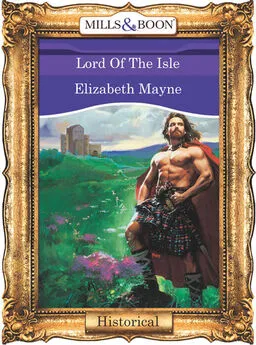


![Стефани Лоуренс - Капитан «Корсара» [Lord of the Privateers]](/books/1097725/stefani-lourens-kapitan-korsara-lord-of-the-pri.webp)

